|
Progressive Men of Iowa
1899
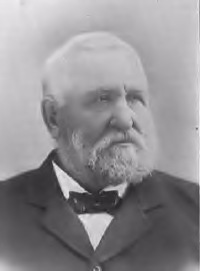 ANSON,
Henry. At Marshalltown, where he is revered and
respected, resides Mr. Henry Anson, founder of
Marshalltown, and who, though now at an advanced
age, is one of its most active and influential
citizens. He was born in Ontario county, N. Y.,
April 19, 1826. ANSON,
Henry. At Marshalltown, where he is revered and
respected, resides Mr. Henry Anson, founder of
Marshalltown, and who, though now at an advanced
age, is one of its most active and influential
citizens. He was born in Ontario county, N. Y.,
April 19, 1826.
His parents removed to
Erie county, Ohio, in 1833, and it was there, in
1846, he married Miss Janet Rice, sister of Hon.
Wells S. Rice. In 1851 Mr. Anson started for the
west, in true pioneer style, arriving in Bureau,
111., in May of that year. It was there he left
his family behind and came over into Iowa on
horseback in search of a location, and finally
chose Marshall county because of its central
location within the state. It was his belief at
that time that the capitol of the state would
someday be located within the border lines of that
county. On his way he passed the fort being
erected by the few early settlers, who were then
in a panic because of a threatened outbreak of the
Sioux Indians, and when he had reached a divide,
which was bounded on the north by the Iowa river
and on the south and east by Linn creek, he became
enraptured with the scene presented, and concluded
to make his future home there.
The preemption cabin
which he then erected was located a little west of
what is now the corner of First and Main streets,
of Marshalltown. He at once took steps for the
survey of a town site, which he will be pardoned
for believing would ultimately be the future
capital of Iowa. The first persons to arrive at
the new Eldorado were Mr. Anson's mother and two
sisters and Horace Anson, a brother. These people
erected the second house in the new city. In 1853
settlers began to arrive in great numbers, but
lumber was hard to get, and to overcome that
difficulty Mr. Anson had a sawmill brought out
from Ohio, and the same proved of incalculable
benefit to the newcomers.
In 1851 commissioners
were appointed to locate the county seat of
Marshall county, and then began a fight which
lasted many years and was only won through the
energy and generous contributions of money of Mr.
Anson. His many shrewd moves to defeat injunctions
by the court during that time would fill a
volume.
At the present time he is at the head of an
immense brick factory, building and real estate
business, and has associated with him in business
his son Sturgis. Adrian C. Anson, the famous
baseball player, is the only other living child.
Mrs. Anson, the wife of our subject, died more
than thirty years
ago.
Mr. Anson always claims
that if the same amount of effort and expense
dispensed is the county seat fight, which lasted
seven years, could have been applied to securing
the location of the capital of the state at that
time, it could have easily been done. His own
contributions in that line were enormous,
embracing nearly one-half mile square of the
choicest of the city property, including the old
court house site, together with a large part of
the material for the building. The present court
house block was later also contributed to the
county by Mr. Anson, he requiring the erection of
a building worth not less than $100,000.
In the spring of 1856
there was consumed by fire two immense lumbering
mills be had constructed for making lumber, lath
and shingles from native timber, that being the
only material for building purposes before the
advent of railways. Insurance in those days in the
west was unknown, and accordingly the loss was
entire, and growth of the city delayed until new
mills could be erected. The flouring mills of the
city at the river were secured by Mr. Anson
donating the site, together with forty acres of
land and $500 in cash for the improvements, to G.
M. Woodbury. Add to this the grounds donated for
railroad depots and other expenses of securing the
roads, together with attorney's fees and other
expenses of seven years' county seat war, and the
modern "tenderfoot" may form some idea of the
efforts necessary in founding and starting the
city of Marshalltown. Mr. Anson has built an
enduring monument for his name in the affections
of the people of his chosen
home.
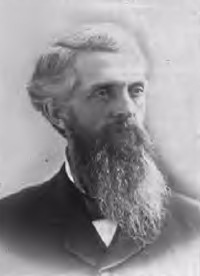 BIRCHARD, Abner Theodore, of
Marshalltown, Iowa, was born near Montrose,
Susquehanna county, Pa., on the 24th day of
August, 1834. BIRCHARD, Abner Theodore, of
Marshalltown, Iowa, was born near Montrose,
Susquehanna county, Pa., on the 24th day of
August, 1834.
His father. Plinny
Birchard, was a native of Massachusetts, and came
to Susquehanna County, Pa., with his parents when
a boy, at a time when the country was an unbroken
forest. The trip was made with what was called a
spike team-a yoke of oxen and one horse ahead. He
was reared and spent his days in that county,
hemmed in from outside strife and trouble, and led
the quiet and uneventful life of a farmer and
neighborhood miller. He died in
1861 at the age of 50. His mother's maiden name
was Martha Griffis, daughter of a revolutionary
soldier and pensioner, living at Unidilla, Otsego
county, N. Y.
Abner T. received his
education at the
country schools of Susquehanna
county, Pa., where the teacher received the
munificent sum of $1.25 per week and boarded
around.
This kind of education was continued summer
and winter, till he was twelve years old, when the
school term was cut in the middle, when thereafter
he only attended three months in the winter. This
continued until he was sixteen years of age, when
he was indentured three years to learn the
cabinet-maker's trade. This indenture included six
months' schooling at a private academy, to finish
his education, and provided for an annual salary
of $25. $40 and $70.
Mr. Birchard came to
Iowa in 1856, when railroads were a rare
convenience, the only one in Iowa then being the
Rock Island, terminating at Iowa City. He came to
Iowa City by rail, thence to Oskaloosa by stage,
having worked at Hampton, 111., as carpenter, for
sufficient money to pay fare to Oskaloosa. Here he
hired out as an itinerant tin peddler during the
summer, and in the fall he had the good fortune to
be employed as manager of a general store to be
opened up at Dakota City, Humboldt county. Thence
he made his way through a wilderness of prairie to
his new position. The county was not then
organized and included a great area of
northwestern Iowa. Here he remained during the
winter of 1856-57. During this winter the last
session of the legislature was held at Iowa City,
which was in continuous session till
July.
The excitement incident
to the Spirit Lake Indian massacre drove the
settlers from the country, and so he moved his
store to Boonesborough, Boone county, where he
located and was joined by his family. He was
married to Orpha Celia Smith, of Dimmock,
Susquehanna county, Pa., July 24, 1854. His wife
died at Boonesborough, Iowa, July, 1860. During
the year 1861, he assisted in the survey and
location of the Chicago & North-Western
railroad from Marshalltown to the Des Moines
river.
In August, 1862, he enlisted in the
Thirty-second Iowa Infantry volunteers, and on
October 7th of the same year he was mustered into
the United States service, with Company I, and was
immediately made quartermaster sergeant and served
in that capacity with the regiment until October
7, 1864, just two years, when he entered the
general hospital at Jefferson Barracks, Mo., as a
patient. Upon becoming convalescent he was sent
home on a furlough, returning to the hospital on
December 7th, and was at once assigned to duty as
a clerk in the headquarters office where he
remained until May, 1865, when he was mustered out
of the service by reason of the termination of the
war, having occupied all the various clerkships in
the office; and the last few months, that of chief
clerk. After mustering out, he took the position
of chief clerk with Capt. T. C. McCall, A.
Q. M., remaining until October, 1865, closing up
the business in the quartermaster's department at
New Madrid and Kansas City,
Mo.
Returning home to
Boonesborough, he entered the service of the
American Express company, as messenger, and in
August, 1866, as agent at Jefferson, Greene
county, having formed a partnership at that place
with Dr. W. S. McBride in
the drug business.
In December was married
to Mrs. Margaret Steele Lytle Birchard. In May,
1867, he removed to Missouri Valley, Harrison
county, establishing a drug business. Closing
out the business at both points in October, 1870,
he removed to Marshalltown, continuing the
partnership in the same business until the fall of
1872, and continued the business till spring of
1886, about two years of this time being in
partnership with C. J. Lander. In 1883 he became a
stockholder in the Marshall Canning company, and
in 1891 acquired all the stock and has since
continued the business. In 1886 he
established a milling business in Norfolk, Neb.,
under the firm name of Birchard, Bridge & Co.,
which was continued until September, 1897. He has
always been a republican. Has held the position of
school director for several years at
Boonesborough, Missouri Valley and Marshalltown,
postmaster at Missouri Valley, member of city
council at Marshalltown, member of board
of commissioners of Iowa Soldiers' home, treasurer
and president of same, and acting
commandant.
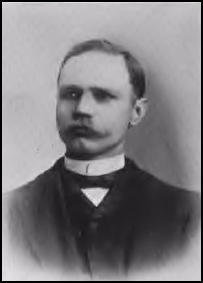 BOUCHER, Dr. Francis Henry,
of Marshalltown, inherits his taste and talent for
his medical profession from his father, James
Henry Boucher, A. M., M. D., who settled in Iowa
City in 1859 and attained high rank in his
profession. He was principal of the Polytechnic
college in Philadelphia, and when the war broke
out was made assistant surgeon of the Thirteenth
Iowa infantry. He was promoted to the rank of
brigade surgeon, acting as medical director of the
army of the Mississippi, and later became medical
director of the army of the Tennessee. He was also
medical director of the Seventeenth Army corps
under Gen. James B. McPherson, of which the famous
Crocker's Iowa brigade formed a part. He was
commissioned colonel, and appointed by General
Grant, who knew him personally and well, to be
medical director of the department of Georgia and
South Carolina, being the only surgeon from Iowa
who attained that rank. When the war closed he
became professor of anatomy in the medical
department of the State University of Iowa. His early
ancestors were French Huguenots, who were driven
into Germany, and finally emigrated to America in
the eighteenth century. A great-grandfather served
for a time in the New York legislature. On his
mother's side the family history goes back to the
time of the revolutionary war, members of her
family taking part with Mad Anthony Wayne in the
storming of Stony Point. BOUCHER, Dr. Francis Henry,
of Marshalltown, inherits his taste and talent for
his medical profession from his father, James
Henry Boucher, A. M., M. D., who settled in Iowa
City in 1859 and attained high rank in his
profession. He was principal of the Polytechnic
college in Philadelphia, and when the war broke
out was made assistant surgeon of the Thirteenth
Iowa infantry. He was promoted to the rank of
brigade surgeon, acting as medical director of the
army of the Mississippi, and later became medical
director of the army of the Tennessee. He was also
medical director of the Seventeenth Army corps
under Gen. James B. McPherson, of which the famous
Crocker's Iowa brigade formed a part. He was
commissioned colonel, and appointed by General
Grant, who knew him personally and well, to be
medical director of the department of Georgia and
South Carolina, being the only surgeon from Iowa
who attained that rank. When the war closed he
became professor of anatomy in the medical
department of the State University of Iowa. His early
ancestors were French Huguenots, who were driven
into Germany, and finally emigrated to America in
the eighteenth century. A great-grandfather served
for a time in the New York legislature. On his
mother's side the family history goes back to the
time of the revolutionary war, members of her
family taking part with Mad Anthony Wayne in the
storming of Stony Point.
Francis H. Boucher was
born in Binghamton, N. Y., November 14,1855. He
attended the common schools in Iowa City, and was
prepared for the university in McClain's academy.
He entered the collegiate department of the Iowa
State university, and later the medical
department, where he attended lectures during the
winter of 1874-75. He then spent two years in the
Jefferson Medical college in Philadelphia and
received from that college the degree of M. D. in
1877. For the better preparation for active
practice, he took a special course in surgery,
under Dr.
J. Ewing Mears, and had special courses in
obstetrics in the Philadelphia Lying-in institute,
and in medicine in the wards of Blockley and
Pennsylvania hospitals, two famous institutions.
In 1893 he received post-graduate instruction in
the Chicago polyclinic for post graduates. He
began to practice when but 21 years of age in
Clarksville, Iowa, and remained there three years,
where he was local surgeon for the Burlington,
Cedar Rapids & Northern railway, examiner for
several insurance companies, and was instrumental
in establishing the local board of health, one of
the first organized under the state law. He was
appointed the first health officer. He is a
charter member of the Butler County Medical
society, and was at one time its secretary and
president. He assisted in the formation of the
Clarksville Library association, of which he was
elected president. While
located in Clarksville he became a member of the
Odd Fellows Lodge, serving successively as its
secretary and noble grand, and joined Marton
Encampment No. 98. He was also here made a master
Mason.
In 1880 he removed to
Brooklyn, Iowa, where he married Miss S. Marian
Judd, daughter of Rev. F. E. Judd, one of the
pioneer clergymen of the Episcopal church in the
state, and Isabella Page Judd, his wife. Mrs.
Boucher is becoming prominent in newspaper circles
as a special correspondent. She is a member of the
Women's National Press association, and as a
musician is noted for her execution of the works
of the classical masters. By this union there have
been born to Dr and Mrs. Boucher
four sons: Forest Francis (deceased), Francis
Emerson, Leonidas James, and James Henry.
After five years of successful practice in
Brooklyn he removed to Marshalltown, where, for
nearly fourteen years, he has been engaged in
active practice. He gives particular attention to
surgery, especially that branch pertaining to the
ear, nose and throat, and has invented several
useful surgical instruments. He has
successfully performed many capital operations in
abdominal, thoracic and cranial surgery, as well
as the more common capital operations on the
extremities.
His surgical, electrical and microscopical
office outfit, to which he is constantly adding
modern instruments; is most complete for any
general surgical emergency, and he has one of the
largest medical libraries in central Iowa. He is
medical examiner for more than twenty life
insurance companies and secret orders; he is local
surgeon for the Iowa Central Railway company, and
is a member of a number of medical societies and
associations, among others the American Medical
association, and International Association of
Railway Surgeons, Iowa State Medical society,
before which he has read papers pertaining to his
profession. He is also a contributor to the
leading medical journals of the country. He is
prominent socially as well as professionally, and
his time, such as can be spared from the many
duties of his profession, is given to the
furtherance of the best interests of his home
city, of which he is health
officer.
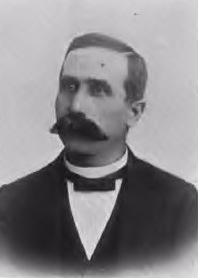 BURKART, Charles J. A
pioneer in newspapermen is Mr. Burkart. and for so
many years was he connected with the Statesman, of
Marshalltown, that to speak of the one is to
allude to the other. Of his
ancestors little can be said. His father and
mother came to the United States from Switzerland
in 1845, and lived a quiet and contented life
without seeking to achieve any great financial
success. BURKART, Charles J. A
pioneer in newspapermen is Mr. Burkart. and for so
many years was he connected with the Statesman, of
Marshalltown, that to speak of the one is to
allude to the other. Of his
ancestors little can be said. His father and
mother came to the United States from Switzerland
in 1845, and lived a quiet and contented life
without seeking to achieve any great financial
success.
Charles J. Burkart was born in
Galena, 111., December 22, 1852. His parents
removed to Savanna, 111., in 1853, where he was
given the advantages offered by the common
schools. When 13 years of age the family went back
to Galena, and Charles entered the schools there,
where he remained for one year. In 1865 he learned
the printer's trade in the Galena Gazette office,
and he has followed the business of publishing and
printing during all the years since that time. It
will thus be seen that nearly all his education
has been obtained by a series of years of
practical experience in the world's greatest
educational work-shop, and without aid from any
person whomsoever.
In June, 1868, he went to Marshalltown,
where he worked at his trade in the different
offices of the city until 1876, when, in
partnership with Mr. U. S.
Mitchell, he founded the Statesman. Mr.
Mitchell brought with him a small outfit of
printing material, and with only a few hundred
dollars of capital, and that borrowed, he began
the difficult task of establishing a democratic
paper in the then banner republican county of
Iowa. Mr. Burkart says that in those days dollars
were as scarce as democrats, and the last-named
article no more numerous than hen's teeth. In 1876
Mr. Mitchell sold out his interest to Mr. Cook
Sanford, and in October, 1879, the entire plant
was disposed of to Byron Webster. In the spring of
1880, however, Mr. Burkart again became a half
owner in the paper, and the firm of Webster &
Burkart continued its publication until November,
1894, when Mr. Burkart became the sole owner. It
will be seen that with the exception of four or
five months Mr. Burkart had the business
management of the paper from the time it was
founded, and through his tireless efforts it
became the official paper of the county with a
large influence and circulation. In January, 1897,
the Statesman was consolidated with the Daily
Press, under the name of the Statesman-Press,
making one of the strongest combinations in
central Iowa. In January,
1898, after twenty-two years' connection with the
Statesman, he disposed of his interests in the
Statesman-Press and retired from the newspaper
business, to devote his time to the Southwestern
Mutual Life association, Marshallto
wn, of which he has been the
vice-president since its organization in
1882.
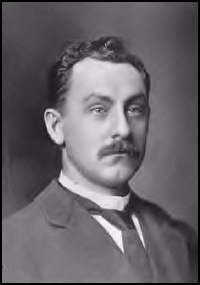 COTTLE, Cassius Clay,
practicing physician in Marshalltown, was born in
Glasgow, Iowa, July 22, 1865, and is the son of
the late Dr. William Wallace Cottle, of Fairfield,
who died in 1880. Dr. W. W. Cottle was born
in Belmont county, Ohio, in 1817, and was of
English ancestry. He was engaged in the practice
of medicine until about 1868, after which he was
engaged in business pursuits and was highly
successful, chiefly in banking. He was married in
February, 1861, to Miss Elizabeth Endersby, a
native of Illinois, also of English descent. He
was a member of the legislature in 1860-61, and
was an influential and useful citizen. COTTLE, Cassius Clay,
practicing physician in Marshalltown, was born in
Glasgow, Iowa, July 22, 1865, and is the son of
the late Dr. William Wallace Cottle, of Fairfield,
who died in 1880. Dr. W. W. Cottle was born
in Belmont county, Ohio, in 1817, and was of
English ancestry. He was engaged in the practice
of medicine until about 1868, after which he was
engaged in business pursuits and was highly
successful, chiefly in banking. He was married in
February, 1861, to Miss Elizabeth Endersby, a
native of Illinois, also of English descent. He
was a member of the legislature in 1860-61, and
was an influential and useful citizen.
At the age of 5 years Cassius C.
Cottle began to attend school and ten years later
was ready for the preparatory course of Parsons
college in Fairfield, where he entered as freshman
in the year 1882. He remained there until the
beginning of the senior year, when he went to the
Commercial college in Iowa City for six
months.
He then entered Rush Medical college in
Chicago in the winter of 1885, and was graduated
in February, 1889. For a year he was supervisor of
the Cook County infirmary He was a charter member
of the Orio Literary society of Parsons
college.
In his boyhood Dr. Cottle had a
liking for mechanics and was fond of working with
tools. During vacations he worked at gun-smithing,
carpentering and at one time was employed on the
survey of the C., K. & N. railroad
in Kansas.
He was a charter member of Chapter
No. 5
of the Agassiz society of natural history and has
been a member ever since. He regards its influence
as an important one in directing him to a
professional career.
Dr. Cottle located in Marshalltown
August 3, 1889, and has been in the successful
practice of his profession in that city
continuously since that time. He is a member of
the American Medical society, Iowa State Medical
society, the Austin Flint Medical association and
the Central Iowa Medical association. Of the
latter he was secretary three years. The doctor
has also been interested in real estate in
Marshalltown and assisted in laying out an
addition and building twenty-eight houses thereon.
He cast his first vote for the republican ticket
and has remained a straight republican ever since.
He was married February 19, 1891, to Hattie
May Church, of Marshalltown. They have had three
children, Margaret E., born November 22, 1892,
died December 9, 1892; Katharine E., born May 4,
1894, and William W., born January 23,
1898.
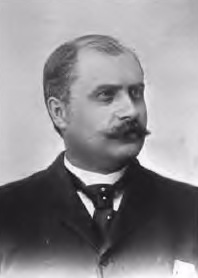 DENMEAD, David Thatcher, a
quiet man of business, thoroughly conversant with
banking, a shrewd financier whose methods are
always confined to legitimate channels, and a
citizen in whom the utmost confidence is imposed
by the people of Marshalltown, is the one to whose
life this sketch cannot do full justice. David
Thatcher Denmead, son of Thomas and Caroline
Denmead, was born in Baltimore, Md., December 4,
1849; from which city his parents removed during
his childhood. Alter a
short residence in Martinsburg, Alexandria and
Wheeling, Va., they settled in Steubenville, Ohio,
where Mr. Denmead passed the greater part of his
early life, attending the public schools. He was
then sent to Gambier, Ohio, to complete his
education, but preferring a different course of
study, finished his school work at the Ohio
Military academy near
Cincinnati. DENMEAD, David Thatcher, a
quiet man of business, thoroughly conversant with
banking, a shrewd financier whose methods are
always confined to legitimate channels, and a
citizen in whom the utmost confidence is imposed
by the people of Marshalltown, is the one to whose
life this sketch cannot do full justice. David
Thatcher Denmead, son of Thomas and Caroline
Denmead, was born in Baltimore, Md., December 4,
1849; from which city his parents removed during
his childhood. Alter a
short residence in Martinsburg, Alexandria and
Wheeling, Va., they settled in Steubenville, Ohio,
where Mr. Denmead passed the greater part of his
early life, attending the public schools. He was
then sent to Gambier, Ohio, to complete his
education, but preferring a different course of
study, finished his school work at the Ohio
Military academy near
Cincinnati.
After leaving school he
was employed as clerk in the office of the
Pittsburg, Chicago & St Louis Railroad
company. He afterwards engaged in general
merchandising and coal mining in Tuscarawas
county, Ohio, and in those ventures was highly
successful.
He came to Iowa in
April, 1876, and located at Marshalltown, engaging
in the lumber and coal business. Later, he
became interested in the wholesale grocery firm of
Letts, Fletcher & Company, a concern which did
an immense business in the western and middle
section of the state. In January, 1886, he sold
his interest in the company and purchased a large
block of stock in the City bank, which has since
become the City National bank. Mr.
Denmead is now president of the institution. It is
one of the sound financial concerns of central
Iowa, with a paid up capital of $100,000. He
married Miss Gertrude Alice Williams, only
daughter of the late Hon. James L. Williams, April
30, 1879. They have three children named James L.,
Harry K. and Dwight H.
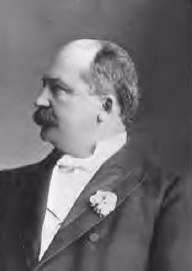 GETZ,
Hiram Landis, of
Marshalltown, ranks among the foremost physicians
and surgeons of the state, and has also been
prominent in political and educational circles;
commissioned by President Cleveland, July, 1894,
for a term of four years as postmaster at
Marshalltown; was for a number of years a member
and twice elected president of the Marshalltown
school board; elected president of the department
of school administration, National Educational
association, 1896. He is of German and Swiss
descent, although his ancestors have lived in
America many generations. His father, Levi Gross
Getz, was a farmer and fancy stock breeder, noted
for his integrity and thrift He died in February,
1896, in Lancaster county, Pa., aged 68 years,
having spent the most of his life on the farm
which had been owned by the family since 1804.
John Getz, the doctor's grandfather, was an
extensive land owner, and was also engaged as a
school teacher. His wife,
Magdalena Gross, was of German descent. Jacob
Getz, Sr., the doctor's great-great-grandfather,
emigrated from Pfalz, Germany, during the
eighteenth century, and settled in eastern
Pennsylvania. Maria Long Landis, Dr. Getz's
mother, was a resident of Manheim township,
Lancaster county, Pa., and is a descendant of Rev.
Benjamin Landis, who came to America in 1717, from
the vicinity of Manheim, on the Rhine, where his
ancestors had been driven from Zurich,
Switzerland, about 1660, on account of their
religious belief, Hans Landis having been there
beheaded in September, 1616. Their
denomination was that of Pietus or Mennonites. The
Landis family is a very old one, their name having
been known to the French and Germans many
centuries ago. A large number of their descendants
still live in Lancaster county, Pa., and
twenty-seven representatives of them were in the
civil war. GETZ,
Hiram Landis, of
Marshalltown, ranks among the foremost physicians
and surgeons of the state, and has also been
prominent in political and educational circles;
commissioned by President Cleveland, July, 1894,
for a term of four years as postmaster at
Marshalltown; was for a number of years a member
and twice elected president of the Marshalltown
school board; elected president of the department
of school administration, National Educational
association, 1896. He is of German and Swiss
descent, although his ancestors have lived in
America many generations. His father, Levi Gross
Getz, was a farmer and fancy stock breeder, noted
for his integrity and thrift He died in February,
1896, in Lancaster county, Pa., aged 68 years,
having spent the most of his life on the farm
which had been owned by the family since 1804.
John Getz, the doctor's grandfather, was an
extensive land owner, and was also engaged as a
school teacher. His wife,
Magdalena Gross, was of German descent. Jacob
Getz, Sr., the doctor's great-great-grandfather,
emigrated from Pfalz, Germany, during the
eighteenth century, and settled in eastern
Pennsylvania. Maria Long Landis, Dr. Getz's
mother, was a resident of Manheim township,
Lancaster county, Pa., and is a descendant of Rev.
Benjamin Landis, who came to America in 1717, from
the vicinity of Manheim, on the Rhine, where his
ancestors had been driven from Zurich,
Switzerland, about 1660, on account of their
religious belief, Hans Landis having been there
beheaded in September, 1616. Their
denomination was that of Pietus or Mennonites. The
Landis family is a very old one, their name having
been known to the French and Germans many
centuries ago. A large number of their descendants
still live in Lancaster county, Pa., and
twenty-seven representatives of them were in the
civil war.
Dr. H. L. Getz was born
November 14, 1850, in East Hempfield township,
Lancaster county, Pa. He obtained his early
education at the district school and the high
school at Manheim, Pa. He also received private
instruction in Latin and German. He has
been a student all his life. In 1885 he graduated
from the Chautauqua Literary and Scientific
circle, and in 1890 received the honorary degree
of A. M. from Iowa college. He began the study of
medicine in 1871, with Dr. John M. Dunlap, of
Manheim, Pa., attended four terms at the Jefferson
Medical college in Philadelphia, graduating March
11, 1874, with special honors in anatomy, being
also secretary of the graduating class. He also
attended lectures and clinics at Will's
Ophthalmic, Allen's Obstetrical and other
hospitals in Philadelphia; was connected with some
of the city's free dispensaries, and was an
assistant and student under Dr. R. J. Levis,
a noted surgeon. He came to Marshalltown, March
20, 1874, opened an office April 1st, and has been
in active practice ever
since.
In addition to his
regular professional work the doctor has served as
medical examiner and surgeon for numerous life and
accident companies, and medical director for the
Northern Life association, of Marshalltown, Iowa
was for many years the city health officer of
Marshalltown, and was the first regularly
appointed county physician for Marshall county. He
is the present chief surgeon for the Iowa Central
Railway company, district surgeon for the
Chicago
North-Western Railway company at
Marshalltown, local surgeon for the Chicago Great
Western Railway company, and surgeon for the
Marshall Light, Power and Railway company. He was
elected professor of physiology at the Chicago
College of Physicians and Surgeons in 1882, but
declined the offer owing to property and other
interests at Marshalltown. In 1884 he was elected
professor of obstetrics, surgical diseases of
women and diseases of children in the Iowa College
of Physicians and Surgeons, at Des Moines, where
he served until 1887, when he resigned in order to
give more time to professional duties at home. In
1894 he was elected professor of anatomy and
clinical diseases of women in the St. Louis
College of Physicians and Surgeons, but did not
accept, owing to his receiving the appointment as
postmaster, there having been thirteen candidates
for the position. He was appointed assistant
surgeon of the Iowa National Guard, and
commissioned captain June 12, 1887, by Governor
Larrabee; commissioned lieutenant-colonel, as a
member of his staff, June 14, 1890, by Governor
Boies; commissioned past assistant surgeon-general
August 19,1889, rank of colonel of the U. R. K. of
P. of Iowa. He has been especially skillful and
successful as a surgeon, performing most of the
major and special operations known to
6urgery.
He has devised an improved combined trocar
canula and aspirating needle; a new uterine
repositor; an antiseptic surgical cabinet; Getz's
bicycle ambulance and hand stretcher, and has
designed Getz's physicians' and surgeons' labor
saving day book and ledger and Getz's daily
conduct record and ledger for penal institutions,
which is now used by the state Industrial schools.
He has been a frequent contributor to many of the
principal medical and surgical journals of the
United States, among them the Journal of the
American Medical Association, the Medical and
Surgical Reporter, the Medical Record and the Iowa
State Medical Reporter, etc., etc. Some of these
contributions were translated and published in
foreign journals, and he had often read original
papers at the state, national and international
meetings of the surgical and medical
fraternity.
In politics the doctor
is independent, having voted with the republican
party until 1884, when he identified himself with
the democrats. In the presidential campaign of
1896 he was in sympathy with the national
democracy. He was appointed a member of the board
of trustees of the Iowa industrial schools in 1886
by Governor Larrabee, to fill a vacancy, and in
1887 the legislature elected him for a full term
of six years. During Cleveland's first and second
administrations he served as a member and
president of the board of pension examiners. Under his
management of the Marshalltown post-office many
reforms and improvements were brought about in the
office, and it was very generally conceded that
the service was the best in the history of the
city. The doctor was appointed to fill a vacancy
as a member of the board of education of
Marshalltown in 1889, and in 1890 was elected for
a term of three years, re-elected in 1893 to a
third term. In 1896 he was unanimously chosen
president of the board and re-elected president in
1897. He was a delegate to the department of
school administration at the National Educational
association (Buffalo, N. Y.) in 1896, and was
there elected the first president of this
department.
Dr. Getz is a member of the leading medical
and surgical societies of the state and nation;
was second vice-president of the State Medical
association in 1882, and first vice-president in
1897; and the founder and first president of the
Iowa Central (State) Medical association. He was
elected vice-president of the International
Association of Railway Surgeons in 1897, and a
member of the executive board in 1898; October 14,
1898, he was elected president of the Iowa State
Association of Railway Surgeons, at Clinton. He is
a member of the following civic societies: Knights
Templars. Mystic Shriners, Knights of Pythias,
Uniformed Rank, K. P., Odd
Fellows, Elks, Princes of Iran, Knights of
Khorasan, and was a charter member of the
wood-men's camp organized in Marshalltown. He
joined the German Reformed church at Philadelphia,
but upon removal to Marshalltown was admitted to
the Presbyterian. His views becoming too liberal
to be in keeping with the church creed he
requested that a withdrawal letter be granted and
that his membership be
canceled.
Dr. Getz was married May 27,
1874, to Miss Mary E. Worley, daughter of Nathan
and Susan Worley. Her paternal grand-mother was
the first white female child born where the city
of Cincinnati now stands. Dr. and Mrs. Getz have
two children, N. Worley, born May 12, 1875,
graduated from the Marshalltown high school, was a
student for three years at Iowa college, general
delivery clerk in the Marshalltown post office for
one year, after which he
attended lectures at Jefferson Medical college,
Philadelphia, for one year, and in 1897-1898 was a
student in the medical department
of the University of Berlin,
Germany; Igerna M., who was born July 13, 1878,
graduated from the Marshalltown high school, later
a student at Miss Baldwin's Bryn Mawr,
Pennsylvania, and in 1897-1898 was a student of
languages in Europe.
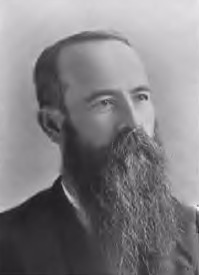 HAMMOND, Hiram, of Le Grand,
Marshall county, has lived in Iowa forty-five
years, during most of which time he has been
engaged in the milling business. He was born near
Smithfield, Jefferson county, Ohio, February 20,
1832, and came to Iowa in the spring of 1854. His
father, Benjamin Hammond, was a farmer, and so
were his ancestors. His mother was Margaret Naylor
Hammond. They were plain people, content with the
good living which the Ohio farm afforded them, and
they remained upon it from 1808 until 1864.
Benjamin Hammond never held an office or sought
prominence in any way. HAMMOND, Hiram, of Le Grand,
Marshall county, has lived in Iowa forty-five
years, during most of which time he has been
engaged in the milling business. He was born near
Smithfield, Jefferson county, Ohio, February 20,
1832, and came to Iowa in the spring of 1854. His
father, Benjamin Hammond, was a farmer, and so
were his ancestors. His mother was Margaret Naylor
Hammond. They were plain people, content with the
good living which the Ohio farm afforded them, and
they remained upon it from 1808 until 1864.
Benjamin Hammond never held an office or sought
prominence in any way.
Hiram had the
experience common to the farmer boys of that time,
working on the farm during the summer and
attending the district school in the winter time.
For eleven months, during the years 1851 and 1852,
he attended a seminary in Mt. Pleasant, Ohio,
where he acquired the rudiments of higher
mathematics-philosophy, chemistry, etc. He taught
two terms district school in Ohio and one in Iowa.
After living in Marshall county in the spring of
1854 with but little means, he managed . get hold
of a piece of land, making plow and five yoke of
cattle. He entered at once the work of subduing
the virgin soil of his adopted state, and his
success has been continuous from that time, though
his business training was altogether that of the
practical man looking after his own affairs. He
had no apprenticeship. In 1863 he sold the farm
and bought a half interest in the Le Grand floor
mills, where he has continued to manufacture a
high grade of the "staff of life" for a large
trade. Mr. Hammond's partner for two years was
Isocher Scholfield, who sold his interest to his
brother, Thomas Scholfield, and he afterwards sold
his interest to W. G. Benedict. At this time
extensive repairs were made on the mill; two farms
contiguous thereto were purchased, and cattle and
hogs raised and fed on a large scale, with good
results. An unfortunate investment in Montana
mining property resulted disastrously to the firm,
and the land was sold to pay up the losses. In 1887
Mr. Hammond purchased Mr. Benedict's interest and
sold it to his son, L. A. Hammond, and the father
and son are now carrying on the business. Although
he has held no office higher than that of county
supervisor, Mr. Hammond began to vote the
republican ticket when John C. Fremont was the
nominee for president in 1856, and has steadfastly
clung to the republican party since that time. He
served on the school board when the present
comfortable, graded school building was erected in
Le Grand. He is a stockholder in the Friends'
Academy Building association, and has been one of
the board of managers of this school, which was
established in 1872, up to the present time. He is
a stockholder in Penn college, in Oskaloosa, and
was for some eight or ten years a director. He
gave all of his children a full course in the
academy, and three of them graduated from Penn
college.
He belongs to the Friends'
church and lives up to the teachings of that
sturdy faith. Mr. Hammond was married in 1856 to
Anna Foglesong, of Ohio. Two sons and four
daughters came to this union, all of whom are
living; five of them married, with families. The
elder son, Lewis A., born July 16, 1859, is
associated with his father in business. The
younger son, Charles L., born March 31, 1867, is
pastor of the Congregational church in Gilman,
Iowa. The oldest daughter, Margaret, born August
24, 1857, married H. H. Salisbury, a machinist,
and is pleasantly located in Pasadena, Cal.; the
second daughter, M. Elisabeth, born April 23,
1861, married the Rev. R. H. Hartley, pastor of
the Presbyterian church in La Porte, Ind.; the
third daughter, Adaline, born February 12, 1863,
married S. M. Hadley, professor of mathematics in
Penn college, in Oskaloosa; the youngest daughter,
Nettie, born June 5, 1865, is unmarried and lives
at home with her parents.
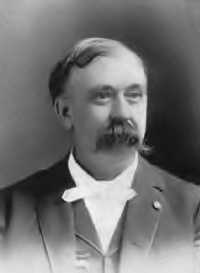 HIBBEN,
Edwin Hayden, of Marshalltown, is secretary and
manager of the Northern Life association, and to
his energy and push, combined with business
sagacity and rare executive ability, is due most
of the success of this well established and
thriving insurance company. Colonel Hibben is the
grandson of Thomas Hibben, who, for more than
forty years carried on a paying business as a
retail dry goods merchant at Wilmington, Ohio. HIBBEN,
Edwin Hayden, of Marshalltown, is secretary and
manager of the Northern Life association, and to
his energy and push, combined with business
sagacity and rare executive ability, is due most
of the success of this well established and
thriving insurance company. Colonel Hibben is the
grandson of Thomas Hibben, who, for more than
forty years carried on a paying business as a
retail dry goods merchant at Wilmington, Ohio.
The colonel's father, George Hibben.
born at Wilmington, Ohio, in 1818, was also a
successful merchant. He moved to Rushville, Ind.,
In 1837, where he became prominent in many
business connections. He was one of the organizers
of the East Hill Cemetery association, was elected
county clerk, and was president of the branch of
the State Bank of Indiana. He removed to Chicago
in 1863, and there became a wholesale merchant. He
was married April 21, 1842, to Jane Fielding, who
was born at Franklin Ohio, October 4, 1821. She
was a daughter of William Fielding, who was born
in Pennsylvania, May 1, 1796 and who was a direct
descendant of Sir Henry Fielding, at one time lord
mayor of London. William Fielding served in the
war of 1812 and afterwards studied medicine at a
school in Cynthiana, Ky., from which he graduated
and then practiced extensively in the counties of
Logan. Champaign and Miami, in Ohio. He was
married to Elizabeth Vail in 1818, at Franklin,
Ohio, and settled at Sidney, Ohio, in 1824. Here
be organized the First Presbyterian church and
Sunday school in Shelby county, and was afterward
elected five times to the state legislature, twice
as a senator. He was grand master and state
lecturer of Masonry, and for forty consecutive
years was the presiding officer in the lodge to
which he belonged.
Col. E. H. Hibben was born May 14,
1848, at Rushville, Ind. His mother died when he
was only 9 years old, and he then went to live
with her parents at Sidney, Ohio. Here he received
his early schooling, and was given his first
lessons in business by clerking in a drug store
mornings, evenings and Saturdays. So apt was he in
business that at the age of 17 he began life for
himself in the wholesale tea, tobacco and cigar
trade in Chicago, and for six years conducted the
business with success, but in 1871 lost all he had
in the great fire. He came to Marshalltown in
1875, and opened a loan and insurance office. In
1882 he organized the Northern Life association,
and under his skillful management it has grown
from a small enterprise to be one of the prominent
insurance companies of
Iowa.
Colonel Hibben is a very enthusiastic
worker in civic organizations, and holds
membership in nearly every order that has ever
been organized. He was twice elected grand
chancellor and once supreme representative of the
Knights of Pythias, and he organized the first
division of the uniformed rank in Iowa, as well as
the first section of the endowment rank. He was
the first man in Iowa to be commissioned as an
instructor in the secret work, and for thirteen
consecutive years he has held the commission. of
aid-de-camp, with the rank of colonel, on the
staff of Maj. James R.
Carnahan. His original commission, dated May 1,
1884, is the first ever issued to an Iowa Knight.
He is a life member of Hesperia Lodge No. 411, A.
F.
and A. M., of Chicago, of the consistory of
Lyons, Iowa, and of the Mystic Shrine. He served
as deputy grand master of the grand lodge of Iowa,
I. O. O. F., and is now grand master. He organized
R. Howe Taylor Canton No. 26, at
Marshalltown. He is
sovereign emir of the world of the Princes of
Iran, a member of the Benevolent Elks, Red Men and
Royal Arcanum.
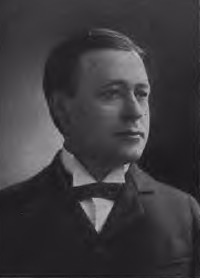 LETTS, Frank Crawford,
president of the Letts, Fletcher company,
wholesale grocers of Marshalltown, is well known
all over the state for his conspicuous success in
life. He was born in Magnolia, 111., April 28,
1858. He was the son of N. H. Letts and Herma
Cowen Letts, natives of Ohio, who went to Illinois
in their childhood. The Letts family settled near
La Salle and the Cowen family in Putnam county,
near Magnolia. The Letts family were farmers and
owned, and still own, large tracts of land in
Illinois. The Cowen family has been quite
Prominent in the history of Illinois. The Dents
and Hamiltons were of her family.
Ex-Governor Hamilton was a first cousin of
Mrs. Letts. The latter was born in 1825 and Mr.
Letts in 1828. They are both living in Yates
Center, Kan. LETTS, Frank Crawford,
president of the Letts, Fletcher company,
wholesale grocers of Marshalltown, is well known
all over the state for his conspicuous success in
life. He was born in Magnolia, 111., April 28,
1858. He was the son of N. H. Letts and Herma
Cowen Letts, natives of Ohio, who went to Illinois
in their childhood. The Letts family settled near
La Salle and the Cowen family in Putnam county,
near Magnolia. The Letts family were farmers and
owned, and still own, large tracts of land in
Illinois. The Cowen family has been quite
Prominent in the history of Illinois. The Dents
and Hamiltons were of her family.
Ex-Governor Hamilton was a first cousin of
Mrs. Letts. The latter was born in 1825 and Mr.
Letts in 1828. They are both living in Yates
Center, Kan.
When Frank C. was 5
years old the family moved to Louisa county and
settled near the town of Letts, which was named
for a brother of N. H. Letts.
Frank C. attended the country school until he was
13, when the farm was sold, and the family went to
Afton and bought and conducted a hotel for several
years. At this time Frank went to Wenona, 111.,
and spent some time with his grandparents,
attending high school. He afterwards attended
public school in Afton, and took a business course
at A. D. Wilt's Business college in Dayton, Ohio.
He had his first business experience working for
P.
Allen mornings and evenings, before and
after school, in his general merchandise store in
Afton, but his business instincts were better
illustrated by an incident which occurred on the
farm.
When he was about 7
years old, several little pigs were left
motherless, and his father told him if he could
raise them he might have half the proceeds. He was
successful, and when the pigs grew up and were
sold he realized about 935. This he reinvested,
and before leaving the farm, at the age of 13
years, he had about $300. After leaving Afton, at
the age of 17 years, young Letts went to Chicago
and accepted a position in the wholesale dry goods
house of A. T. Stewart &. Co. He worked hard
and within a year had been rapidly promoted.
Before he was 19 years old he attracted the
attention of A. C. Jordan,
of the firm of W. A Jordan & Company, of
Ottumwa, a customer of the house, who asked him
how he would like to go into business for himself
in Iowa, and offered to furnish the capital. This
seemed a very promising opportunity, and Mr. Letts
advised with Jas. H. Walker, then the manager of
the house, later himself the head of the great dry
goods house of J. H. Walker & Company. The
firm disliked to lose Mr. Letts, but said that it
looked like a good opportunity. Mr. Jordan
selected Marshalltown as the place to begin;
furnished about $30,000 capital, and left Mr.
Letts entirely in charge of the business. The
business was very successful. About six months
later W. I. Bates Company, one of the largest
concerns in the town, failed and Mr. Jordan bought
the stock from the mortgagee and consolidated the
business. That was in the fall and winter of 1877
and 1878, and there being fewer railroads and
small towns around Marshalltown than now, the
country trade was immense, the retail sales
some-times amounting to tl,200 on Saturdays. The
profits were better than they are now, and inside
of a year the young partner had quite a sum to his
credit. Mr. Letts speaks very highly of Mr.
Jordan, who started him in business. Later he and
Mr. Walker, both Mr. Letts' early friends when he
was a poor boy, met with reverses and lost their
property.
In the summer of 1879
Mr. Letts sold his interest in the dry goods
business to Mr. Jordan and joined the Hon. Delano
T. Smith in the breeding of Shorthorn cattle. In a
year he had the business thoroughly mastered, and
owned it all. He visited all the sales and bought
cattle of good family and individual merit, and
took them home and fed them up so they presented a
better appearance and brought higher prices. He
was highly successful in the Shorthorn business.
Later he was interested in the Ketchum Wagon
company, and was its secretary. In 1883 he closed
out all his other interests and went into the
wholesale grocery business in Marshalltown. The
firm was Lacy, Letts & Gray, but Mr. Lacy and
Mr. Gray concluded there was too much hard work
and too little profit in the business and they
withdrew, selling to Mr. T. J. Fletcher and Mr. D.
T. Denmead, bankers of Marshalltown. The firm
was changed to Letts, Fletcher & Company. In
1886 a stock company was formed and Mr. Letts was
elected president and treasurer, which offices he
now holds. Mr. Denmead and Mr. Fletcher have since
retired. The officers of the company, besides Mr.
Letts, are H. L. Spencer, Oskaloosa,
vice-president; A. P. Spencer, Oskaloossa,
secretary; and the directors are the three
officers named, and H. E. Sloan and W. S Robbins.
In 1894 the firm started another house in Mason
City and incorporated the Letts, Spencer, Smith
company, of which Mr. Letts is president. In May,
1898, they bought one of the oldest wholesale
grocery establishments on the Missouri river, the
Turner-Frazer Mercantile company, of St. Joseph,
and formed a stock company called the Letts,
Spencer Grocery company, with 200,000 paid-up
capital. Mr. Letts is president of that company
For several years he was secretary of the
lowa-Nebraska Wholesale Grocers' association, and
resigned the position during 1898 because of lack
of time. He is a director in the City National
bank, of Marshalltown.
Mr. Letts has borne a
prominent and influential part in the politics of
the state and has always been an enthusiastic
republican. His activity in politics has been
directed towards helping others, and he has never
been a candidate for any office, although in 1895
he was widely mentioned for the republican
nomination for governor. He served on the military
staff of Governor Jackson, Governor Drake and
Governor Shaw, In the year when Robert G. Cousins
was first nominated for congress, and during Mr.
Letts' absence from home, some of his friends
started a movement to secure him the congressional
nomination. When he reached home he put a stop to
this and called attention to Mr. Cousins,
for whose nomination he put forth his best
efforts. He has always been an ardent supporter of
Mr. Cousins, and is proud to say that he always
will be.
Mr. Letts is a Knight
Templar and Shriner, but has been too busy to
.hold office in either organization. He is not a
member of any church, but usually attends services
at the Presbyterian church. Mr. Letts
was married April 28, 1879, to Mary J. Smith,
daughter of Hon. Delano T. Smith, in Marshalltown.
She died in August, 1892. To this marriage were
born two children: Fred C., born November 27,
1884, and Herma Leoni, born April 14, 1888. Mr.
Letts was again married November 11, 1897, in
Washington, D. C., to Miss Cora Perkins, daughter
of the late United States Senator Perkins, of
Kansas.
Few men in business have
found the time to make as large an acquaintance
and accumulate as many friends in all parts of
Iowa, and particularly among the young men. He was
for several years treasurer of the republican
state league, and should he ever appear in the
political arena as a candidate, would have a great many active supporters
in every part of the state.
PACKARD, Stephen
Bennett, now living in quiet upon his large farm
near Marshalltown, has had a notable career, and
his name is connected with the history of some of
the most troublous times the United States has
ever seen.
He is the best known
for his connection with the reconstruction days in
Louisiana, where he was elected governor in 1876,
and afterwards abdicated as a pan of the
settlement of the presidential dead-lock, out of
which Hayes was made president. Governor Packard
was born in Auburn, Me., April 26, 1839. His
parents were Stephen Packard and Roxanna Briggs
Packard. Stephen Packard was a son of Nehemlah
Packard, who was born in Massachusetts in 1762,
and Betsey Packard, born in 1764. Nehemiah
Packard, grandfather of S. B., was a son of Samuel
Packard, and his wife, a sister of Gen. Benjamin
Lincoln, of revolutionary fame. Nehemiah entered
the army at the age of 14 years and served as a
drummer boy and as drum major with his uncle,
Benjamin Lincoln, until the end of the war. The
Packard family came from Ipswich, England, in
1638, and settled in Bridgewater, Mass. Samuel
Packard was the first of the family in this
country.
They afterwards moved to Maine, where they
attained prominence. The governor's father was
born in North Auburn, Me, September 12, 1793. and died
there December 26, 1870. He was a mill owner and
held several local offices. He served in the
militia in the war of 1812. His wife, Roxanna
Briggs, came from a wealthy and influential family
and had brothers and sisters residing in
Auburn.
Stephen Packard was a direct descendant of
the original Samuel Packard, who came from
Ipswich, England in 1638.
Young Stephen went to
the village school until he was 16 years of age,
when he took a course in the Westbrook seminary,
and at the age of 20 began the study of law with
Hon. C.
W. Walton, afterwards one of the justices
of the supreme court of Maine. He was president of
the Philomathian Adelphl society of the seminary
during all the time he was a student there. He
taught two terms of school in 1860, previous to
beginning the study of law. He left the law office
October 15, 1861, and joined the Twelfth Maine
regiment of infantry as first lieutenant of
Company G. He was promoted to be captain of
Company B, and served until the regiment was
mustered out in December, 1864. The regiment was
assigned to Gen. Benjamin F. Butler's division,
which participated in the Louisiana campaign, and
in the capture of New Orleans and Port Hudson. In
1864 Captain Packard served as judge advocate in
New Orleans under General Reynolds. In July, 1864,
the regiment joined Sheridan's army, being a part
of the Nineteenth army corps, and served with it
until It was discharged. Captain Packard's company
was the color company of the regiment during this
campaign, and when it was mustered out he was
designated to convey the regimental colors to
Augusta, Me., and deposit them with the governor
of the state, which duty he proudly
performed.
While in New Orleans
Captain Packard met Miss Emma Frances Steele, a
daughter of Captain Peter Steele, an old and
respected resident of New Orleans, and they were
married in December, 1863, in New Orleans. After
he was discharged from military service, Captain
Packard went to New Orleans and began the practice
of law. In 1867 he was elected delegate to the
state constitutional convention, and was made
chairman of the board of registration, consisting
of seven men, who were charged with the duties of
administering the civil affairs of the state from
the adjournment in April, 1868, until the
inauguration of the new state government in July,
1868 He was appointed register of conveyances for
the city of New Orleans and served until April,
1869, when he was appointed United States marshal
for the district of Louisiana. At this time
Governor Packard was in the height of his power in
the state and was recognized as the controlling
force in the politics of Louisiana. He was the
personal representative of President Grant. As a
delegate to the republican national convention in
1876 he voted for the nomination of Blaine only
after it did not seem possible to secure a third
nomination for President Grant. He was reappointed
by President Grant, and in November, 1876, was
elected governor of the state. He had made an
active and aggressive campaign in the state and
was never intimidated or insulted by the
southerners, Yankee though he was. He went into
the worst districts in the state, where it was
supposed that a northern man or republican was
hardly safe at all, and yet he was so feared and
respected that he was entirely safe. He was
Inaugurated governor in January, 1877, but in the
manipulation of the eleotoral returns and in the
settlement of the famous Hayes-Tilden presidential
contest, he was compelled to abdicate, which he
did April 25, 1877. A committee appointed by the
Hayes administration obtained a quorum of members
in the so-called Nicholas legislature by breaking
a quorum in the state house legislature, which
supported Governor Packard. It was part of the
arrangement by which Hayes became president. Governor
Packard was appointed United States consul at
Liverpool in July, 1878, and served until July,
1885.
Returning from England, be sought a more
quiet life and purchased his now famous Strathmore
stock farm near Marshalltown, where he now resides
with his family. Since living in Iowa he has
served as a member of the Iowa Columbian
commission, which had charge of the Iowa exhibit
at the World's fair, and on the Iowa commission at
the Trans-Mississippi exposition at Omaha. He is a
charter member of the Iowa commandry of the
military order of the Loyal Legion, and is a
member of the Iowa Society of the Sons of the
American Revolution. Governor
and Mrs. Packard have six children living, three
sons and three daughters, viz.: Ada, born
September 4, 1867; Blanche, born January 21, 1869;
Stephen Bennett, Jr., born September 19, 1871;
Walter Steele, born November 31, 1875; Sidney
Steele, born August 7, 1877; Ella, born February
6, 1879.
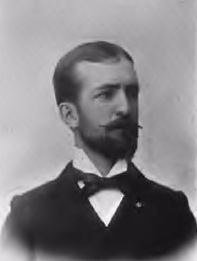 PIERCE, Franklin Gilman,
mayor of the city of Marshalltown, is a young man
of wide resources, both native and acquired. He comes
of good Puritan ancestry, being a descendant of
John Pearce, who settled in Rhode Island in 1632.
Another ancestor, John Pierce, served in the
revolutionary war. Mr. Pierce's father, William
Pierce, a carpenter and builder, of moderate
circumstances, was born in 1621, at North
Kingston, R. I. He was married in 1865 to Martha
Jane Moore, who was born in 1849, at Columbus,
Ohio, and whose ancestors, the Moore and Wilson
families, are among the oldest in
Virginia. PIERCE, Franklin Gilman,
mayor of the city of Marshalltown, is a young man
of wide resources, both native and acquired. He comes
of good Puritan ancestry, being a descendant of
John Pearce, who settled in Rhode Island in 1632.
Another ancestor, John Pierce, served in the
revolutionary war. Mr. Pierce's father, William
Pierce, a carpenter and builder, of moderate
circumstances, was born in 1621, at North
Kingston, R. I. He was married in 1865 to Martha
Jane Moore, who was born in 1849, at Columbus,
Ohio, and whose ancestors, the Moore and Wilson
families, are among the oldest in
Virginia.
F.
G. Pierce is a native of Iowa, having been born at
Earlville, in Delaware county, December 7, 1868.
When he was three years old he removed with his
parents to Marshalltown, where he has lived most
of the time since. He began his education in the
schools of that city, and graduated from the high
school in June, 1886. He entered the State
university in 1888, graduating in June, 1892, with
the degree of Ph. B. While attending the
university he was a member of the Phi Delta the
fraternity, and took an active interest in
athletics, serving as manager in 1890 and captain
in 1891 of the university football eleven. He was
also prominent in literary work, being elected
editor-in-chief of the Junior Annual, published by
his class.
After his graduation he was engaged, in the
insurance business at Marshalltown for several
years, but in 1895 abandoned this for the more
congenial vocation of journalism. He first
published the Marshall County Register, but in
1896 consolidated with the Daily Press, in which
he still owns an interest.
Politically, Mr. Pierce has always
been a republican. In 1895 he was elected mayor of
Marshalltown on a non-partisan ticket Representing
the wishes of the people who desired a reform
looking toward greater economy in the city's
expenses, he was supported largely by laboring men
and elected with a good majority. During his
first year in office he had an unfriendly council
to contend with, but in 1896 new men were elected
who were more in sympathy with him, and he was
able to carry out the wishes of his supporters. So
well did he accomplish this that he was re-elected
in 1897 and again in 1899, and is still serving
the interests of the taxpayer. In
municipal affairs he has always been in favor of
municipal ownership of public franchises and has
written a number of articles for different papers
dealing with this aspect of city affairs. He was
vice-president for Iowa of the League of American
Municipalities in 1898. Mr. Pierce is a
member of the Masonic Order, Knights of Pythias,
I. 0. 0. F., Benevolent Elks, Red Men, Modern
Woodmen of America, Maccabees, Ben Hur and Court
of Honor. He is also a member of the Sons of the
American Revolution, and belongs to the
Congregational church. He was married June 30,
1897, to Miss Nellie M. Loree, of
Marshalltown.
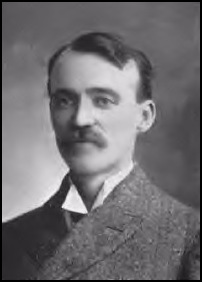 TITTEMORE, James Nelson, of
Marshalltown, was born on a farm near Eureka,
Winnebago county, Wis., March 2, 1864. His
father, Nelson Tittemore, was a machinist and
millwright, and was born in the state of New York.
He came of English, Dutch and Holland ancestors,
who settled early in the New England states and
were mostly farmers. His mother, Margaret Crowley,
was born of Irish parentage. When a
child her parents settled near Oshkosh, Wis.,
where she lived about forty years. The father died
in 1882.
Mr. Tittemore is unmarried. His mother and
two sisters live with him. He has also two sisters
married and one brother dead. They have a lovely,
hospitable home and are the social center of a
large circle of friends. Mr. Tittemore seems to
live to brighten the lives and gratify the tastes
of his sisters and mother, without a thought of
self. TITTEMORE, James Nelson, of
Marshalltown, was born on a farm near Eureka,
Winnebago county, Wis., March 2, 1864. His
father, Nelson Tittemore, was a machinist and
millwright, and was born in the state of New York.
He came of English, Dutch and Holland ancestors,
who settled early in the New England states and
were mostly farmers. His mother, Margaret Crowley,
was born of Irish parentage. When a
child her parents settled near Oshkosh, Wis.,
where she lived about forty years. The father died
in 1882.
Mr. Tittemore is unmarried. His mother and
two sisters live with him. He has also two sisters
married and one brother dead. They have a lovely,
hospitable home and are the social center of a
large circle of friends. Mr. Tittemore seems to
live to brighten the lives and gratify the tastes
of his sisters and mother, without a thought of
self.
His business career has been
successful, with promotions following each other
in quick succession. His first dollar was earned
as telegraph operator at the age of 16. He has
been promoted from one to another of the following
positions: Telegraph operator and station agent on
the Milwaukee, Lake Shore & Western railway in
Wisconsin; traveling auditor, Chicago &
Northwestern railway; traveling passenger agent,
Milwaukee, Lake Shore & Western railway;
station agent, Soo Line; chief clerk general
freight department, Soo Line; traveling freight
agent, Great Northern railway; general freight
agent, Sioux City & Northern railway and
Pacific short lines; assistant to president of the
last named companies; general freight and
passenger agent, Des Moines Northern & Western
railway, and general freight agent, Iowa Central
Railway company; acting general manager of the
Iowa Central railway.
Mr. Tittemore aspires to farm life
and hopes someday to take a position in this line
of work. He is fond of live stock and proud of his
farmer ancestry. His father served through the
civil war as a private. He was in
Andersonville prison several months and was
mustered out of service in the summer of 1864. He
is a republican and a member of the Catholic
church. He is one of Iowa's promising young men,
finely educated and polished in manner and speech,
although his education in the schoolroom covered
only about five years. By
personal application and study he stands equal to
any who have had the opportunities of the
magnificent schools of our
commonwealth.
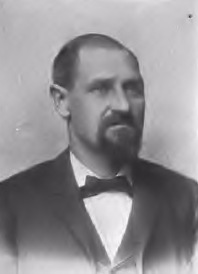 TURNER, George A., of
Marshalltown, represented his county in the state
senate in the Twenty-fourth and Twenty-fifth
General Assemblies. He is now a resident of the
city of Marshalltown, where he is engaged in the
real estate and loan business, but for many years
he was a successful and progressive fanner. While
in the senate he was chairman of the important
committee on insurance. TURNER, George A., of
Marshalltown, represented his county in the state
senate in the Twenty-fourth and Twenty-fifth
General Assemblies. He is now a resident of the
city of Marshalltown, where he is engaged in the
real estate and loan business, but for many years
he was a successful and progressive fanner. While
in the senate he was chairman of the important
committee on insurance.
Senator Turner was born in Canton,
111., March 28, 1843, and his parents were of
Yankee ancestors, coming from Vermont and New
York. His father, Samuel Turner, was a farmer in
moderate circum-stances, and was one of the
pioneers of Illinois. His wife was Miss Sallie
Brookins, a native of New York. Their son was
educated in the public schools, including the
graded school of Canton.
Mr. Turner came to Marshall county
April 2,1867, and settled on a piece of new land
in the north-western part of the county. He owns
the same farm now, and his success may be imagined
from the fact that it has grown to a fine estate
of 1,100 acres, near Bromley. Mr. Turner has been
successful in business since boyhood, when he was
taught the essential principles of business. He earned
his first dollar in Canton, raising onions. He has
been for fifteen years a director in the
Marshalltown State bank, and is largely interested
in public enterprises in Marshalltown. He has
always been a republican, and for nine years was a
member of the board of supervisors of Marshall
county. During this time the magnificent new court
house and jail were built, and he says he is more
proud of his part in this than anything else of a
public nature that he has done. He is at present a
member of the school board of Marshalltown.
He
is a Mason and Knight Templar, and a member of the
Christian church and of the Grand Army of the
Republic.
He enlisted three times as a volunteer
during the civil war; first for three months, but
never saw very active service. He was first
lieutenant and quartermaster of the Fifty-first
Illinois infantry. Mr. Turner
was married September 15, 1870, to Miss Maggie
Garber, of Marshall county. They have two
children, Ella F., born 1876, and Frank E., born
1883. Mrs.
Turner died October 12,
1898.
The information
on Trails to the Past © Copyright may be used in personal family history research, with source citation. The pages in entirety may not be duplicated for publication in any fashion without the permission of the owner. Commercial use of any material on this site is not permitted. Please respect the wishes of those who have contributed their time and efforts to make this free site possible.~Thank you! |